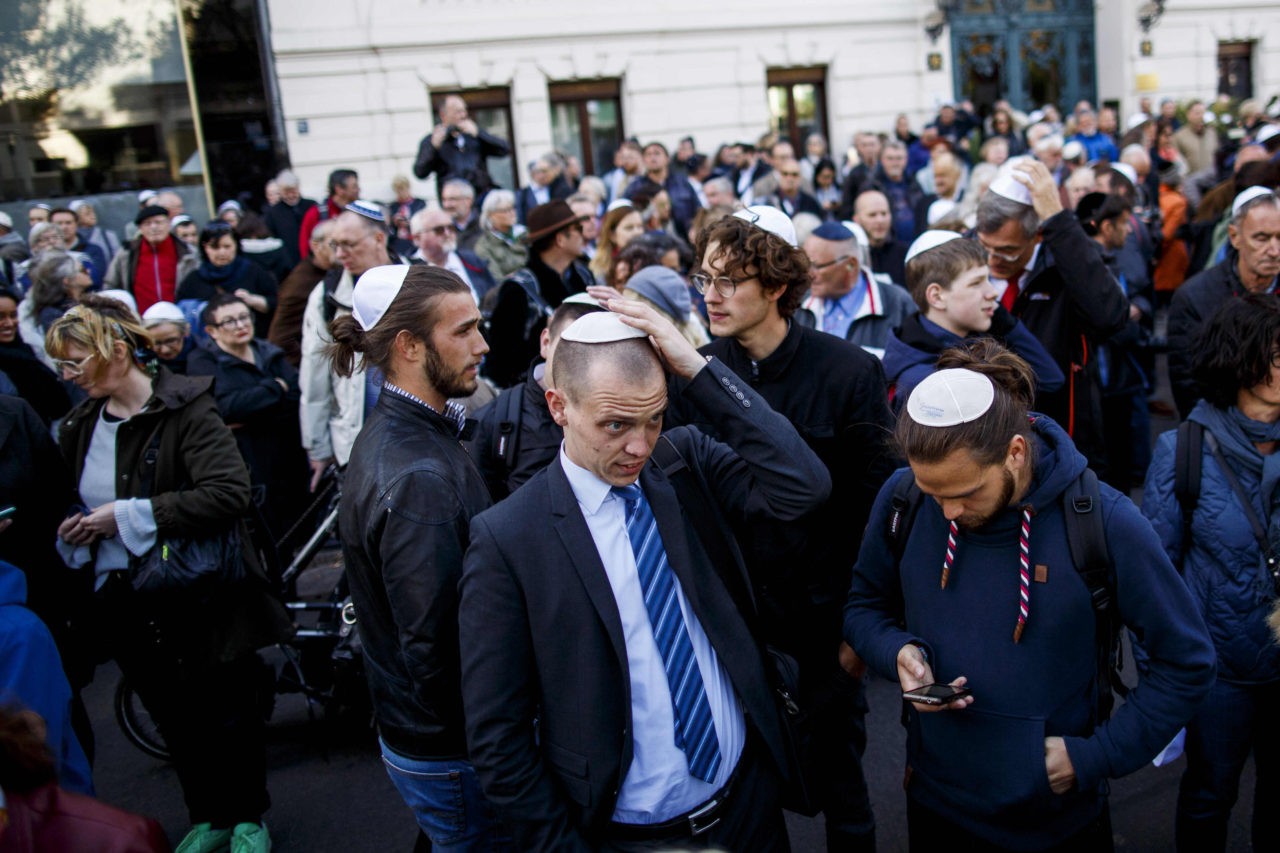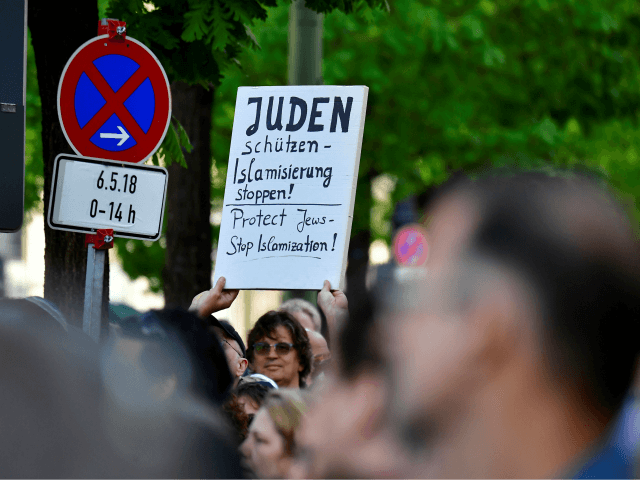The German government’s first special envoy to the Jewish community has warned that Jews’ fear over the influx of Muslim, Arab refugees is legitimate.
Dr. Felix Klein also counseled German Jewish men to exercise caution before appearing in public spaces wearing the traditional kippah headpiece.
Dr. Klein chose an interview with the Times of Israel to reveal his concerns for Jews on the same day rallies took place across the country supporting Jewish people after a spate of shocking anti-Semitic assaults. One such rally in Berlin ended early when angry counter-protesters shouted “terrorists”, spat at them, and snatched their Israeli flag, organisers said.

Berlin’s Mayor Michael Mueller, speaks at a “wear a kippah” gathering to protest against anti-Semitism in front of the Jewish Community House on April 25, 2018 in Berlin, Germany. The Jewish community made a public appeal for Jews and non-Jews to attend the event and wear a kippah as a show of solidarity. (Carsten Koall/Getty Images)
Asked directly if a German Jew can wear a traditional kippah in a public place without concern, Dr. Klein, who was appointed earlier this month as the German government’s first special envoy for Jewish life and combating anti-Semitism, replied: “In principle, yes. But not always.” He continued:
But they have to be vigilant. It’s not entirely without danger; one has to be alert. In the end, everyone has to assess the risks for himself. The danger is there. But I wouldn’t necessarily agree with those who say it’s absolutely impossible to show one’s Jewishness in public in Germany.
Last week Germans were stunned after a 19-year-old Syrian refugee attacked two young men wearing kippahs with his belt in the heart of the capital.
A video of the Berlin assault, filmed by one of the Israeli victims, went viral on social media and sparked widespread revulsion.
Earlier this month, two rappers sparked on outcry by winning the Echo music prize after selling more than 200,000 copies of their album which features a lyric boasting that their bodies are “more defined than Auschwitz prisoners”.
Organisers of the Echo prize said Wednesday they would axe the award because they did not want it to be “seen as a platform for anti-Semitism, misogyny, homophobia, or the playing down of violence.”

Participants wearing a kippah during a “wear a kippah” gathering to protest against anti-Semitism in front of the Jewish Community House on April 25, 2018 in Berlin, Germany. The Jewish community made a public appeal for Jews and non-Jews to attend the event and wear a kippah as a show of solidarity. (Carsten Koall/Getty Images)
As for the future, Dr Klein said that Germany’s Jewish population had legitimate fears because of the influx of almost one million mostly Muslim immigrants from the Middle East and North Africa sparked in 2015 by chancellor Angela Merkel.
German Jews have long warned that many of the new arrivals hail from countries where hatred of Jews and of the State of Israel were taught from an early age.
He echoed German Chancellor Angela Merkel who said last week that Muslim immigrants have added a new strain of anti-Semitism to German culture by holding Jews solely responsible for the Israeli-Palestinian conflict.

Activists holding a sign with the word Shalom on it attend a “wear a kippah” gathering to protest against anti-Semitism in front of Cologne Cathedral or Koelner Dom on April 25, 2018 in Cologne, Germany (Michael Gottschalk/Getty Images).
“We also have new phenomena (of anti-Semitism in Germany). We have refugees now, for example, or people of Arab origin who are bringing a different type of anti-Semitism into the country,” Merkel told Israeli TV. “In the new government, we have for the first time appointed a commissioner for Jewish life in Germany and in the fight against anti-Semitism.”
“These concerns are legitimate,” Dr. Klein affirmed. “The events of the last week showed that there are concrete reasons for it,” he added, referring to the anti-Semitic attack on the Arab-Israeli man in Berlin. “That must spur us into examining this problem and not simply ignoring it. However, I’d like to point out that Jewish institutions needed police protection even before 2015.”

Participants wearing a kippah during a “wear a kippah” gathering to protest against anti-Semitism in front of the Jewish Community House on April 25, 2018 in Berlin, Germany. (Carsten Koall/Getty Images)
The German government’s decision to allow the refugees unrestrained entry was borne out of a humanitarian emergency, Dr. Klein explained.
“At the time, Joseph Schuster, the head of the Central Council of Jews in Germany, pointed out the views on Israel and Jews that these people have and the problems that come with that. He was right, unfortunately. But given the circumstances at the time, the government’s decision is understandable. Now this will have to be an incentive for us to tackle the integration of these people.”
Around 200,000 Jews live in Germany, most of them immigrants from the former Soviet Union. That’s fewer than half of the 500,000 Jews who lived in the country before the Holocaust.
Follow Simon Kent on Twitter: Follow @SunSimonKent or e-mail to: skent@breitbart.com

COMMENTS
Please let us know if you're having issues with commenting.